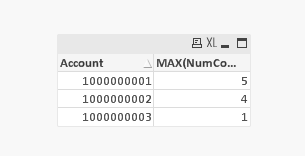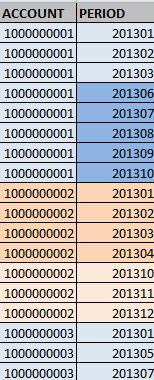Unlock a world of possibilities! Login now and discover the exclusive benefits awaiting you.
- Qlik Community
- :
- All Forums
- :
- QlikView App Dev
- :
- Get the Maximum Number of Consecutive Periods
- Subscribe to RSS Feed
- Mark Topic as New
- Mark Topic as Read
- Float this Topic for Current User
- Bookmark
- Subscribe
- Mute
- Printer Friendly Page
- Mark as New
- Bookmark
- Subscribe
- Mute
- Subscribe to RSS Feed
- Permalink
- Report Inappropriate Content
Get the Maximum Number of Consecutive Periods
Hello!
I have a table with Accounts and Periods (YYYY/MM) and I need to get the maximum number of consecutive Periods for each Account. For example, in the following table:
The result would be:
For Account 1000000001, the result is 5 because it obtains the Periods: 201306, 201307, 201308, 201309 and 201310.
(201301, 201302 and 201303 are not considerated because despite they are consecutive, the count would be only 3).
The same happens to the other Accounts.
Notes:
I would need this as an expression in any table object instead of in script because the Accounts and Periods are dynamic (they vary) for a corresponding selection in the application.
Thank you!!!
- Tags:
- new_to_qlikview
- Mark as New
- Bookmark
- Subscribe
- Mute
- Subscribe to RSS Feed
- Permalink
- Report Inappropriate Content

SCRIPT
Temp:
Load * Inline
[
Account, Period
1000000001, 201301
1000000001, 201302
1000000001, 201303
1000000001, 201306
1000000001, 201307
1000000001, 201308
1000000001, 201309
1000000001, 201310
1000000002, 201301
1000000002, 201302
1000000002, 201303
1000000002, 201304
1000000002, 201310
1000000002, 201311
1000000002, 201312
1000000003, 201301
1000000003, 201305
1000000003, 201307
];
NoConcatenate
load
*,
if(Account=Peek(Account)
and
(
(Period=(Peek(Period)+1))
or
(
left(Period,4)=left(peek(Period),4)+1
and Right(Period,2)='01'
and Right(peek(Period),2)='12'
)
),
peek(NumConseq)+1, 1) as NumConseq
resident
Temp
order by Account, Period;
The script shoul work also wiith different years like (bold)
Temp:
Load * Inline
[
Account, Period
1000000001, 201301
1000000001, 201302
1000000001, 201303
1000000001, 201306
1000000001, 201307
1000000001, 201308
1000000001, 201309
1000000001, 201310
1000000001, 201311
1000000001, 201312
1000000001, 201401
1000000002, 201301
1000000002, 201302
1000000002, 201303
1000000002, 201304
1000000002, 201310
1000000002, 201311
1000000002, 201312
1000000002, 201402
1000000002, 201403
1000000003, 201301
1000000003, 201305
1000000003, 201307
];

